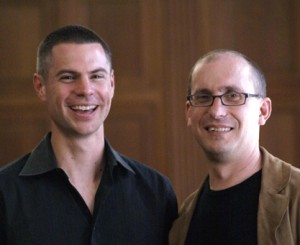
The environmental studies department will be hosting Michael Shellenberger and Ted Nordhaus to speak on Tuesday, April 19 in Alumni Hall at 7:30 p.m.
Shellenberger, who is president, and Nordhaus chairman of The Breakthrough Institute are known to be distinguished voices on the discussion about energy and climate policy innovation.
Shellenberger and Nordhaus have made a career out of writing and advocating in the environmental studies area; however; the duo take a dramatically different approach than other environmentalists.
“To summarize … they argue that we as a nation should aggressively invest in clean energy research innovation that will make low-carbon energy the preferred choice economically as well as environmentally,” Professor and Director of the Johnson Center for Environmental Innovation Jim Dontje said.
Shellenberger and Nordhaus present an alternative to more regulatory-based approaches, and also attempt to limit carbon emissions. In regard to the climate and energy security policy issues discussed by the duo, the college has sated its own two official policies:
“One: to be seeking cost-effective ways to reduce the campus energy costs. Two: to be a signatory to the American College and University President’s Climate Commitment (ACUPCC). The ACUPCC commits us to a series of steps leading Gustavus to reduce its greenhouse gas emissions,” Dontje said.
“I think that [the lecture] is a really great opportunity for students to [learn about] sustainable-related issues, especially during Earth Week. There’s many things that individuals can learn because it’s going to be a bigger issue in the future, so it’s nice to get that kind of exposure,” first-year and Co-President of the Gustavus Greens Greg Wiessner said.
In the Breakthrough blog, Shellenberger and Nordhaus discuss on how they can create an efficient and practical use of energy. They strongly believe that nations should focus on lowering the cost of fossil fuel and making it more affordable for the rich and the poor. They believe innovation can be done in a globalized fashion between nations to protect fossil fuel as well as share them.
“How do we accomplish that? Stop subsidizing old technology that will never compete with fossil fuels and create incentives for innovation. Along with ramping up support for research, governments should buy cutting-edge clean-energy technologies, prove them and then give away the intellectual property so others can improve on it,” Shellenberger and Nordhaus said on their blog.
“Part of what they are doing, I think, is trying to woo the business and investment community in a strategy that will be more palatable to that community,” Dontje said.
“If you want to learn more about Earth Week, [you] should attend this lecture. If students want to learn more, its nice to have someone who’s more knowledgeable and gives us a deeper insight,” sophomore and co-president of the Gustavus Greens Greta Klawiter-Lein said.
In the Breakthrough, Shellenberger and Nordhaus believe they can push more innovation; however; the main competitors that stand in their way are the large companies that focus on more consumers and are blinded by their own greed. They also believe that the government can help, if only it put in the effort. They discuss more about these ideas and their proposal on their blog.
“I believe it is important for students to know the difference between an activist and a scholar. An activist is basically a salesperson. That person may be selling snake oil, but his job is to make it look good,” professor of economics and management, Glenn Barnette said.
This is not to say that professor Barnette believes Shellenberger or Nordhaus are liars or unethical. However Barnette cannot accept them as an authority in energy economics. In addition, he would advise students to think twice about using their work as sources in the students’ research.
You have shared so nice blog. I get so important information from this blog.Thanks